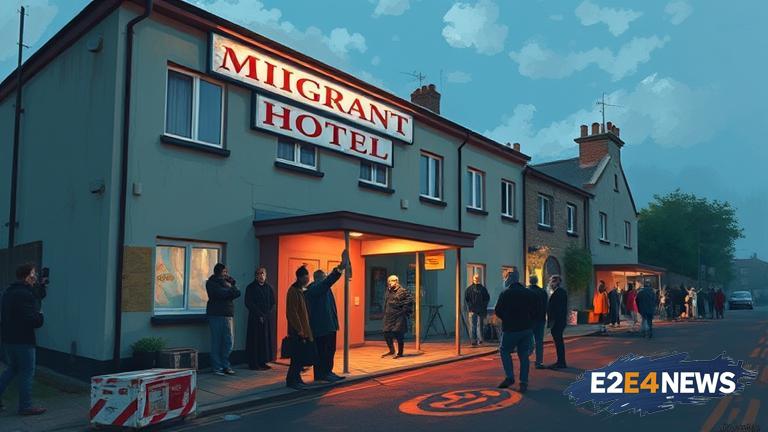Protests have broken out across Britain as the government’s decision to house migrants in hotels has sparked widespread controversy and debate. The move, aimed at alleviating the pressure on the asylum system, has been met with resistance from local communities and critics who argue that it is not a sustainable solution. The protests, which have been taking place in various parts of the country, have seen demonstrators clashing with police and expressing their discontent over the government’s handling of the migrant crisis. The issue has become a highly politicized one, with many arguing that the government’s policies are too soft on immigration. Others, however, have expressed concern over the treatment of migrants and the conditions in which they are being housed. The use of hotels to accommodate migrants has been criticized for being expensive and ineffective, with many arguing that it is not a viable long-term solution. The government has defended its decision, stating that it is necessary to ensure that migrants are provided with safe and secure accommodation while their claims are being processed. However, critics argue that the move is a knee-jerk reaction to the crisis and that more needs to be done to address the root causes of migration. The protests have highlighted the deep divisions within British society over immigration, with many calling for tougher controls and others advocating for a more compassionate approach. The issue has also sparked a debate over the role of the government in providing support to migrants, with some arguing that it is a moral obligation and others claiming that it is a drain on resources. As the protests continue, it remains to be seen how the government will respond to the growing criticism and whether it will be able to find a solution to the migrant crisis that satisfies all parties. The use of hotels to house migrants has also raised concerns over the impact on local communities, with some arguing that it will put a strain on resources and services. Others have expressed concern over the potential for tensions to rise between migrants and local residents. The government has sought to reassure communities that the migrants will be provided with support and that measures will be taken to ensure that they integrate into society. However, the issue remains a contentious one, with many arguing that more needs to be done to address the concerns of local residents. The migrant crisis has also sparked a wider debate over the UK’s immigration policies, with many calling for reform and others arguing that the current system is too complex and bureaucratic. The government has pledged to review its immigration policies and to introduce new measures to tackle the crisis. However, the process is likely to be slow and contentious, with many different stakeholders and interests at play. As the situation continues to unfold, it remains to be seen how the government will balance the competing demands and find a solution that works for all parties. The protests over migrant hotels are just one symptom of a wider crisis that requires a comprehensive and sustainable solution. The government must work to address the concerns of all parties and to find a way forward that is fair, compassionate, and effective. The use of hotels to house migrants is a temporary measure, but it highlights the need for a more permanent solution to the crisis. The government must work to provide safe and secure accommodation for migrants, while also addressing the root causes of migration and working to prevent further crises from arising. The issue is complex and multifaceted, and it will require a coordinated and sustained effort to resolve. The government must work with local communities, NGOs, and other stakeholders to find a solution that works for all parties. The migrant crisis is a global issue, and it requires a global response. The UK must work with other countries to address the root causes of migration and to find a solution that is fair and sustainable. The use of hotels to house migrants is just one part of a wider response to the crisis, and it must be seen in the context of a broader strategy to address the issue. The government must be transparent and accountable in its response to the crisis, and it must work to build trust with local communities and other stakeholders. The migrant crisis is a challenging and complex issue, but it is not insurmountable. With the right approach and the right policies, it is possible to find a solution that works for all parties and that addresses the needs of migrants and local communities alike.
